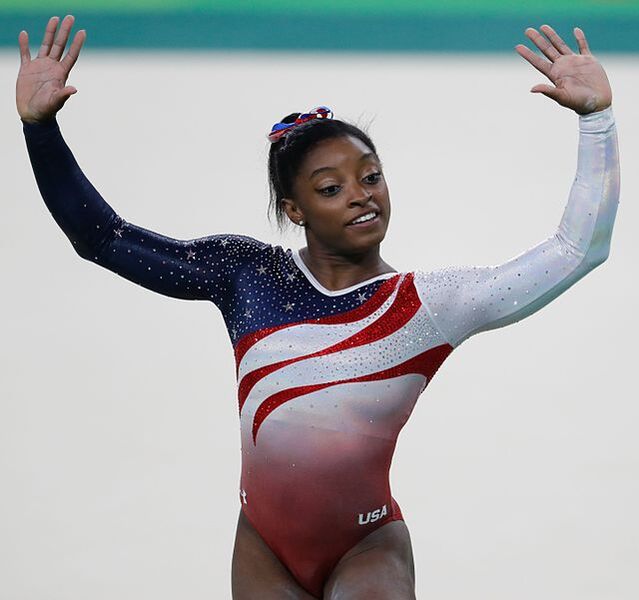Health
Simone Biles and Team USA Redefine Mental Toughness
The true definition of mental grit and what we can learn from it.
Posted July 29, 2021 Reviewed by Chloe Williams
Key points
- American gymnast Simone Biles withdrew from the Olympic gymnastics team final and encouraged "putting mental health first."
- American gymnasts have endured decades of sexual, emotional and verbal abuse stemming from gymnastics organizations and personnel.
- Prioritizing mental health and knowing one's limits takes courage in a society that tends to put performance and profits above wellbeing.

It is July and the Tokyo Olympics are in full swing. Many of us wait with electric anticipation for this event every four years. For many sports, including gymnastics, the Olympics is the pinnacle of athletic mastery.
American gymnastics has dominated the world stage since 2012, when the United States team won their first team gold medal since 1996. The past eight years could be named the Simone Biles era, as the gymnast has ushered in a different phase of gymnastics — powerful, poised gymnastics with a new level of difficulty and stakes.
Biles has continued to make headlines since her debut on the world gymnastics stage. Not only does she have a whopping total of four skills named after her, but she is also the most decorated gymnast in history. She is known for her consistency and grace on the global stage, and for using her platform to speak out on social injustices.
But in the Olympic gymnastics team competition, the unthinkable happened. Biles completed a different vault than planned — only a one and a half twist instead of her planned two and a half twists. Biles herself described this as the “twisties,” meaning she lost awareness of her body in the air. Appropriate body awareness is a critical component of safe gymnastics. Needless to say, this vault was a turning point that led to a withdrawal from the team competition. Later, Biles would withdraw from the individual all-around competition as well.
Biles herself said in an interview:
“I took a step back because I didn’t want to do something silly out there and get injured so I thought it was best if the rest of the girls took over and did the rest of the job which they absolutely did.”
She also encouraged putting “mental health first” and reiterated that doing so shows strength as a competitor and a person.
None of us can truly know what happened on the Olympic stage. However, we got the message loud and clear — health and safety are above winning.
The backdrop
USA Gymnastics has failed to prioritize mental health and basic human rights over profits and performance. Sexual abuse, perpetuated for decades by former USA Gymnastics doctor Larry Nassar, was allowed to happen under toxic leadership. Not to mention the same leadership system perpetuated decades of emotional and verbal abuse. At the very least, we can say that for years, gymnasts have been indoctrinated into a system that viewed athletes as objects to fulfill the goals of the organization and provide entertainment for the masses.
Additionally, Black athletes have high mental health needs that often go undetected or untreated. Black athletes have been historically excluded from gymnastics and Biles, along with other Black athletes, are not receiving the appropriate skill values from judges. Some systems, like college gymnastics, have recently come under scrutiny for discriminating against Black athletes. In other global events this year, three Black English athletes were racially abused after their penalty shootout performances in the Euros 2020 final, and a Black female tennis athlete, Naomi Osaka, was abused on social media for her decision to protect her mental health and abstain from media appearances at a Grand Slam event.
All of this comes on the backdrop of widespread racial injustice and trauma (for example, recent police brutality and racism within America) that Black individuals are forced to continually relive, heightened in a pandemic year that showed large discrepancies in the treatment and care of Black and ethnic individuals. Representing a country in which this violence occurs is an additional injustice for Black Americans.
None of these injustices disappear because of an international competition. The effects of trauma are widespread, including emotional detachment or dysregulation, chronic health conditions, and changes in self-view and world-view. The survivors of the Larry Nassar atrocities are still processing trauma, while Black athletes are attempting to exercise self-care after a year of traumatizing racialized events and a pandemic. The Olympic games add an additional magnifying glass to the burden and pressure of "needing to be perfect," particularly because any perceived failure on the part of Black athletes renders them targets of abuse.
Competing versus healing
The effects of trauma do not go away because we push them under the rug. Healing from trauma takes purposeful rest, community, support, and reparations. It takes time. Unfortunately, many Olympic athletes are fighting against time to compete in the games. Many athletes feel pressured to put healing on the back burner while they pursue their Olympic dreams.
This issue of healing vs. competing also speaks to a broader mental health conversation that’s been ongoing for decades. While the two are not mutually exclusive, athletes are under an enormous amount of pressure that is made worse by public scrutiny. Many organizations have given lip service to the idea that “mental health is important.” However, this argument has no teeth until it is backed up with real behaviors, rather than just words. Which is exactly what Simone Biles and her teammates did.
If you ask 100 people on the street, chances are many will agree that “mental health is important.” But how many will support you in taking the time necessary to truly take care of your mental health, regardless of the consequences? When people criticize Simone Biles for caring for herself, they send the message that profits, outcomes, and medals are more important than individual well-being. This phenomenon is dehumanizing and is made more complicated by harmful race, gender, and athlete stereotypes. It is clear that our society is still miles away from truly prioritizing collective health over financial and entertainment systems.
Beyond the mental health conversation, many people have introduced the idea of mental toughness. As a former gymnast and sport psychologist, I spend a lot of time educating athletes on the idea of mental toughness, a key component of sport performance.
What mental toughness is and is not
Mental toughness is historically defined as the ability to compete consistently at the upper limits of performance, despite setbacks. However, the definition of mental toughness is often misconstrued to mean the relentless pursuit of excellence past one’s limits despite extenuating circumstances. At some point, people started to believe that mental toughness meant pushing through all barriers, no matter the cost. This is not the case and this view is very harmful.
Mental toughness is about pushing yourself to your upper limits, but it isn’t about pushing yourself past limits. We all know that pushing past limits leads to illness, injury, and competing at lower levels of performance. Many athletes are well-practiced in pushing themselves past their limits. Most often, athletes need additional awareness training to understand what their actual limits are to prevent burnout and injury. The fact that Biles understood her own limits of performance is an enormous skill and represents a special courage.
For this reason, the conversation should center less around mental toughness and more around mental poise. Mental poise, a term originally coined by Garnder and Moore and outlined in the Mindfulness Acceptance and Commitment protocol for sport, is defined as performance in the service of goals and values — an individual’s personally held principles or standards of behavior. Biles and her teammates have clearly demonstrated sport participation in the service of their values.
Mental poise is not about pushing past limits of physical and mental anguish. It is an acute awareness of the present moment, your personal limits, and the limits of the environment. It is understanding when your performance is at its peak, and at what point efforts are counterproductive to your own well-being and the well-being of others. It is using a moral compass to drive your behaviors and actions.
It is also critical to note that elite athletes train their entire lives for these events. A withdrawal is not something that is taken lightly. It is likely not avoidance (although only the athlete can say that for certain) or selfishness, as most athletes thrive in these environments and would do anything to be able to compete. This rhetoric is not only untrue and harmful, but it also discredits the immense talent and ability of Biles and her teammates, all of whom made the Olympic team of their own merits and efforts. Alternatively, the choice to step back shows immense respect for self and team.
This conversation is one step towards changing the culture of athletics. Athletes are humans first, and the value of humanity is not tied to our achievements. These athletes are finally redefining—for themselves—what performance success looks like.
Mental poise and mental health, front and center
The events of Tokyo have created a wide-open conversation about mental health. The collective trauma at the backdrop of American gymnastics can no longer be ignored, particularly for Black athletes. It is clear collective healing is needed, and so is a change in how we talk about the mental well-being of athletes and individuals.
No longer should athletes be viewed as sub-human robots used to serve the needs of the masses. Conversations around athletics must be intersectional and critically evaluate how individual differences interact with cultural environments and systems. Only then will we be able to provide an open, safe, and collective environment for athletes to thrive in.
The bottom line is that mental health is always a worthy endeavor — no matter the cost.




